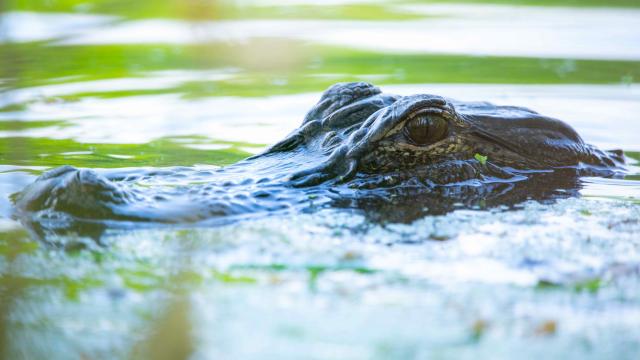American alligators in a notoriously polluted North Carolina waterway could be facing similar consequences from chemical contaminants as local people, according to new research. Gators living in the Cape Fear River, with high levels of PFAS (polyfluoroalkyl substances) accumulated in their blood, displayed signs of weakened immune systems and autoimmune disease, according to a study, published Thursday in the journal Frontiers in Toxicology.
PFAS are a class of manmade compounds commonly called “forever chemicals” because of how difficult they are to break down. PFAS don’t degrade naturally, instead accumulating in the environment, our bodies, and — as research increasingly shows — wildlife. And studies suggest they cause lots of health problems in humans, including increased risk of multiple cancer types, liver disease, and immune dysfunction. Despite the known risks, the chemicals are still widely manufactured and used for a variety of commercial and industrial applications, from fire-fighting foam to grease-resistant takeout containers.
One such manufacturer is Chemours Co. Fayetteville Works in Bladen County, North Carolina (formerly a DuPont facility), located along the Cape Fear River. The plant has been pumping out PFAS and related chemicals for decades, and in the process has contaminated the waterway and the nearby community’s drinking supply.
In 2020, a state Department of Environmental Quality assessment found that levels of some PFAS in local sewage downstream of the Chemours factory were more than 14 times the previous 2016 safe threshold recommended by the EPA. Earlier this year, the EPA revised that threshold with an interim guidance essentially declaring that there is no safe level of PFAS in drinking water.
Chemours was ordered by the EPA to clean up its act in 2020, but has yet to meaningfully do so. And in the meantime, humans as well as alligators are likely suffering the consequences.
Researchers in the new study collected and tested blood samples from 75 different alligators. 49 of the animals were from different sites along and nearby the Cape Fear river, while 26 were from Lake Waccamaw, which is in a separate watershed with no known PFAS manufacturing.
All of the gators had some level of PFAS in their system (a signal of just how ubiquitous the chemicals are), but the Cape Fear crocodilians had much, much more. Adult alligators sampled from the river had a mean PFAS concentration in their blood more than ten times that of the lake gators. And a subgroup of 26 alligators from Greenfield Lake, a man-made reservoir adjacent to Cape Fear River and the site closest to the PFAS factory, were the worst off.
The scientists also found the Cape Fear alligators had a higher diversity of PFAS compounds in their systems compared with the Lake Waccamaw ones, with a median of 10 different chemicals vs. 5.
Yet, even more concerning, the researchers conducted several different assessments of immune function comparing the Greenfield Lake Gators and their Waccamaw counterparts. They found that the animals living in the Cape Fear watershed had significant signs of immune system issues across multiple metrics including red blood cell abnormalities, high enzyme activity, and gene expression that could signal autoimmune disease. In one test, the Greenfield crocodilians had 400 times more of a hallmark protein linked with Lupus in humans in their blood than the Waccamaw group.
“When we see elevated expression of [this protein] in these alligators, then, it tells us that something in these alligators’ immune responses is being disrupted,” said lead study researcher Scott Belcher, a biologist at North Carolina State University, in a news statement about the findings.
Belcher and his colleagues also noticed another disturbing trend: some of the Cape Fear alligators had prominent skin lesions. On seven out of the 49 total gators from the river watershed, the researchers observed apparently unhealed and infected wounds.
“The presence and appearance of these lesions were reminiscent of slowed wound healing…associated with some autoimmune diseases in humans,” the authors wrote in the published study. None of the Waccamaw alligators showed similar symptoms. Alligators from all sites had some fresh or healed wounds (gators get scrappy, after all) — but unhealed, oozing, and odorous sores were only seen in the Cape Fear population.
“Alligators rarely suffer from infections,” Belcher said in the NCSU press release. “They do get wounds, but they normally heal quickly. Seeing infected lesions that weren’t healing properly was concerning,” he added — which was part of why the researchers dug down into the animals’ immune system function so deeply.
It’s worth noting that the study’s sample size is small, which means statistically the scientists weren’t able to establish a causative link between the detected immune differences and the level of PFAS exposure. Plus, the same differences in immune signals they captured in adult gators weren’t always statistically significant for juveniles. And other factors could be contributing to the problem of sick gators. For instance, other undetected chemical contaminants might be circulating in the environment.
Yet previous research from the same group of scientists has also shown similar immune dysfunction in striped bass in the Cape Fear watershed. And lots of other studies have demonstrated that PFAS are accumulating in wildlife — from birds to deer.
And where there’s PFAS, there are likely problems. The new North Carolina study isn’t just bad news for the gators. American alligators are a sentinel species because of their long lifespan and position at the top of the food chain, according to the researchers. They’re also considered indicators of environmental change because of their sensitivity to water conditions. If the gators are suffering, the rest of the food web could soon be too.
